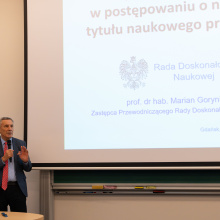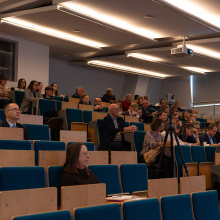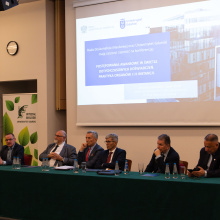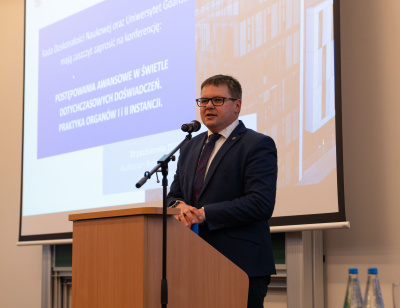
Promotion proceedings were the subject of the Council for Scientific Excellence meeting held on 20 October 2025 at the University of Gdańsk. The conference entitled ‘Promotion procedures in the light of previous experience. The practice of first and second instance bodies’ aroused the interest of researchers and raised many questions.
The event, organised by the Council for Scientific Excellence and the University of Gdańsk, was opened by a representative of the University of Gdańsk authorities, Vice-Rector for Research, prof. dr hab. Wiesław Laskowski, who, after welcoming the guests, gave the floor to the members of the Council.
During the first presentation, the Chairman of the RDN, prof. dr hab. Bronisław Sitek, referred to the case law of administrative courts in matters of academic promotion: ‘Judicial and administrative review of decisions made in academic promotion proceedings was first introduced into the Polish legal system by the Act of 12 September 1990 on academic titles and degrees,’ recalled the Chairman. - By the will of the legislator, administrative courts control the activities of both doctoral and habilitation entities, as well as the Council for Scientific Excellence. This control is of particular importance in relation to the shaping of academic promotion proceedings as a special type of administrative proceedings, especially in view of the general, but also vague, clause on the appropriate application of the provisions of the Code of Administrative Procedure.’
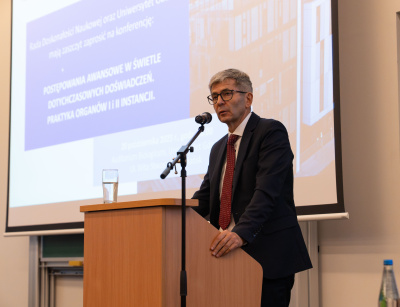
Prof. Bronisław Sitek then presented, among other things, selected theses from the case law of administrative courts in cases concerning academic promotion proceedings, emphasising the importance of the protocol and meticulous justification of the decision taken in relation to the material assessed.
In turn, the Deputy Chairman of the RDN, prof. dr hab. Marian Gorynia, discussed in detail the criteria and procedures for the award of the academic title of professor. He referred, among other things, to the concept of ‘excellence’ of a candidate for the title of professor, as enshrined in Act 2.0: ‘These outstanding achievements are used in the Act in the plural, which means that there must be at least two,’ explained the speaker. Summing up his speech, prof. Marian Gorynia noted: "The scientific value of an achievement is not determined by where it is published (journal, publisher), but by the content of the publication. The RDN has no competence or tasks related to the evaluation of scientific journals and publications, therefore, no coefficients (such as Impact Factor, MNiSW points and others) or the title of the journal or the name of the publisher can be decisive in the evaluation of an application.’
The next speaker, Deputy Chairman of the RDN, prof. dr hab. Grzegorz Węgrzyn, referred to his predecessor's speech, emphasising, among other things, that: ‘In habilitation proceedings, habilitating entities should apply the same rules for the substantive evaluation of applications as those applied by the RDN when considering applications for the title of professor. The internal regulations of habilitating entities should not contain quantitative limits, in particular those specifying minimum bibliometric indicators, points, etc.
Prof. Grzegorz Węgrzyn also spoke about how the term ‘cooperation’ should be understood in proceedings for the award of a postdoctoral degree. He added that the current law has abolished time limits. ‘The achievements of candidates should be recognised as a significant contribution to the development of a specific discipline as of the date of commencement of the proceedings.’ They may therefore also be documented by publications issued before obtaining a doctoral degree, said the Deputy Chair of the RDN. He also discussed the course of the colloquium, drawing attention to the procedure in the event of a negative decision on the award of a postdoctoral degree.
He also referred to false information circulating in the community that the RDN does not randomly select reviewers, as prof. Marian Gorynia also mentioned. Prof. Grzegorz Węgrzyn presented the mechanism for randomly selecting reviewers.
In turn, the conditions for awarding a doctoral degree were presented by the Secretary of the RDN, prof. dr hab. Mansur Rahnama-Hezavah, who explained both the rules of the old procedure and those introduced after 1 October 2019. Among the rules concerning the latter procedure, he mentioned, among others: ‘The supervisor and reviewer do not have to have a title in the same discipline as the topic of the thesis, but they must have relevant experience. The reviewer cannot be the academic supervisor , emphasised the Secretary of the RDN. - If there are at least two negative reviews, which must be written and public, the thesis cannot be admitted for defence. The details of the procedure are determined by the university, but its rules must comply with applicable law.’
The Director of the RDN Office, dr Jerzy Deneka, in his speech entitled ‘Good practices in commissioning reviews’, explained how to understand the status and role of a reviewer, what a review is in a formal sense, and what points should be included in a contract for specific work concluded with a reviewer. He also pointed out that a review is a public document and should be presented, for example, at the request of journalists. He also recommended familiarising oneself with the sample documents that the RDN has prepared and made available on its website.
The last presentation was given by Artur Woźniak, Head of the Legal and Academic Staff Development Department of the Office of the Council for Scientific Excellence, entitled ‘Selected proposals de lege ferenda based on the current practice of applying the law in matters of academic promotion’, which he began by presenting the evolution of academic promotion procedures from 1920 to the present day. He also discussed the RDN's proposals for changes to the system of authorisation to award doctoral and postdoctoral degrees.
The three main proposals are:
- the introduction of periodic inspections of the exercise of the right to award doctoral and postdoctoral degrees by doctoral and postdoctoral awarding institutions, based on precisely defined criteria for its exercise.
- The possibility of restricting or suspending these powers in cases where specific violations in their exercise by doctoral and postdoctoral awarding institutions are found.
- Granting of powers at the request of interested entities with the appropriate scientific category, i.e. those with the appropriate scientific staff.
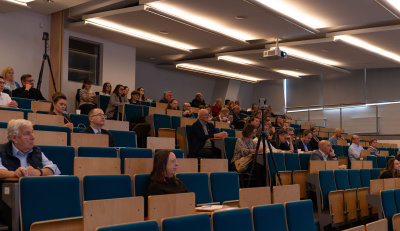
After the lectures, the audience asked the RDN members many questions relating to their own experiences, the RDN's statements and the interpretation of the provisions of the Act.

